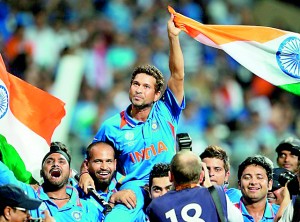Looking back at 2012
View(s):Welcome Back, Yuvraj (September)
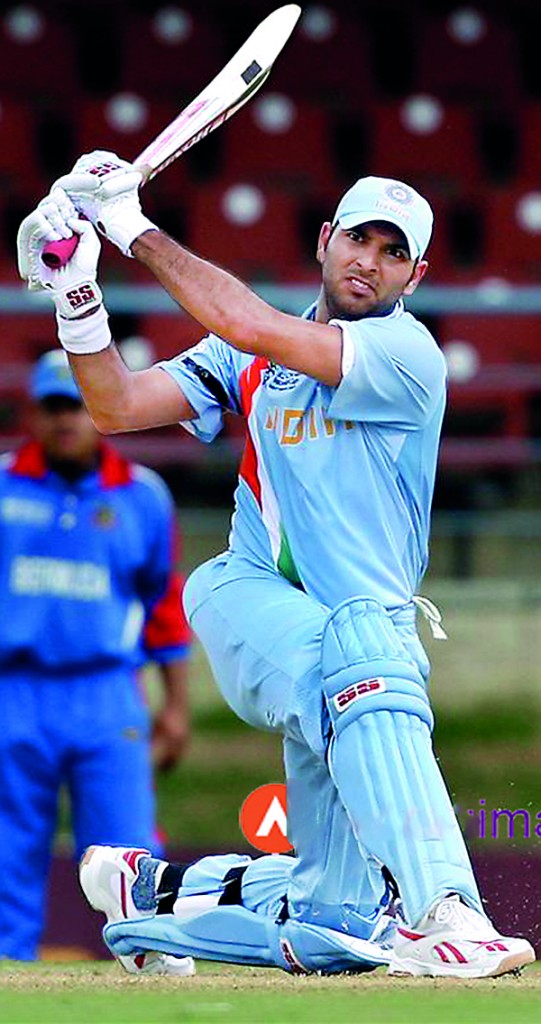
Yuvraj Singh
There’s something about a good comeback story that tugs at the heart strings, and cricket fans from India and beyond watched with bated breath as Yuvraj Singh walked onto the field in September following his battle with cancer. The all-rounder made his return from a rare form of lung cancer in the second T20I against New Zealand to a standing ovation, and while it wasn’t the stuff of a lifetime movie (game-winning century, etc) it wasn’t anti-climactic. He took two catches, bowled two overs and then made 34 runs, including two sixes, in the chase as New Zealand won by one agonising run. Since then, the sentiment has faded, as it does, and he was dropped for the fourth Test against England due to poor form, which is a good thing in the long run because our breath is no longer bated.
The Mighty Triple Ton (July)
No South African batsman had scored a triple century in a Test match, until Hashim Amla did so in magnificent style against England at The Oval in July. Amla batted for a mind-boggling 13 hours and faced 529 deliveries as the Proteas amassed 637 for two. He struck 35
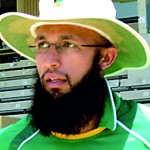
Hashim Amla
boundaries, and played with such technique and composure that writers were composing sonnets in his honour for days afterwards (and even now, if this paragraph is anything to go by). There were few batsmen who captured the cricketing public’s attention this year as much as Amla did, and he went on to score another ton at Lord’s to help win the series. He followed it up with a successful tour against Australia too, and ended the year as the third-most prolific Test run-scorer. Alastair Cook was second behind Michael Clarke, but the England skipper played five more Tests than Amla.
Windies Winning the World T20 (September)
Few people dislike the West Indies team. They’re such fun to watch when they play well, and because of their poor form in recent years, they became the underdog everyone liked to cheer for. They were billed as dark horses ahead of the World Twenty20 in September, and it wasn’t surprising when they did well in the group stages. And then they continued to do well… And they trashed Australia in the semi-finals… And suddenly they had the world behind them as they faced hosts Sri Lanka in the deciding game. Smart money still sat 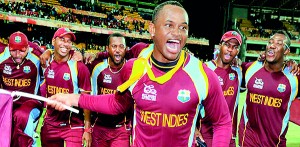 with Mahela Jayawardene’s side, but when Marlon Samuels hit a brilliant 78 off 56 balls, the tide turned. The Windies’ joy when they won by 36 runs gave me a few sniffles, mostly because I failed to bet on them like I’d planned before the tournament began.
with Mahela Jayawardene’s side, but when Marlon Samuels hit a brilliant 78 off 56 balls, the tide turned. The Windies’ joy when they won by 36 runs gave me a few sniffles, mostly because I failed to bet on them like I’d planned before the tournament began.
Double double Tons (November)
It’s difficult to isolate one goose bump moment when it comes to Michael Clarke, because his form with the bat this year has been insane. Sick. Ridiculous. He started the year in the best possible way, making 329 not out against India in January, which would become the first of his four knocks to pass the 200 mark in 2012. No batsman had ever struck four double tons in one year, and he did it against quality attacks, following that 329 up with a 210 two Tests later in the same series. His other double-ton spate came against the Proteas in November, and they were back-to-back – 259 not out in Brisbane and then 230 in Adelaide. Frustratingly for him, both those games ended in draws and the visitors ended up winning the series. Clarke became Australia’s highest runscorer in a calendar year by scoring 1595 runs to beat Ricky Ponting’s record of 1544 runs, after scoring 74 and 57 at Hobart and 106 at the MCG against Sri Lanka.
Hat-trick Hero (June)
Sri Lanka and Pakistan seem to play countless limited-overs matches against each other, but the fourth ODI in Colombo in June broke
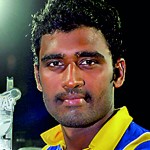
Thisara Perera
the monotony some that thanks to a cracking hat-trick from Thisara Perera. The fast bowler, bowling in his side’s defence of 243, dismissed Younis Khan, Shahid Afridi and Sarfraz Ahmed in the 41st over, and Pakistan thus collapsed to a 44-run defeat. It was one of two hat-tricks this year, the other by Christian against the self-same Sri Lankans earlier in March.
Olympics
Definitely the ‘star’ of the 2012 London Olympics was Jamaican Usain Bolt. As expected he won the 100m and 200m golds, but did not make a new mark.
Mo Farah of England led the UK athletic revival. He raised a low of eyebrows with his unexpected 500 and 10000 metre ‘Golds’.
Dumped for doping
Lance Edward Armstrong (born Lance Edward Gunderson, September 18, 1971) was an American former professional road racing cyclist. Armstrong had won the Tour de France a record seven consecutive times between 1999 and 2005, but in 2012 he was disqualified from all his results since August 1998 for using and distributing performance-enhancing drugs and was banned from professional cycling for life.
Turned pro-boxer
Former England allrounder Fred Flintoff who earlier retired from cricket, turned a professional boxer in December and won his first bout against Richard Dawson at 39-38.
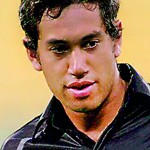
Ross Taylor
Dropped
New Zealand cricket captain Ross Taylor who led his team from the front with a century to remember and led his team to win in Colombo following their Galle defeat was stripped off his title upon their return home.
Kiwi might in rugby (October)
The 2012 Rugby Championship was the inaugural annual rugby union series between the national rugby union teams of New Zealand, Australia, South Africa, and Argentina. For sponsorship reasons, the competition was known as The Castle Rugby Championship in South Africa, The Investec Rugby Championship in New Zealand, The Castrol Edge Rugby Championship in Australia and The Personal Rugby  Championship in Argentina.
Championship in Argentina.
The 2012 Rugby Championship kicked off on 18 August with New Zealand defeating Australia and finished on 6 October. Each team played the other twice on a home and away basis. The inaugural Championship was won by New Zealand.
Revived (December)
Arch foes India and Pakistan revived their cricketing ties with a Limited overs series which is being played in India at present.
Herath, the Test bowler (December)
With the five wicket haul against Australia at Sydney in the first Test, left-arm spinner Rangana Herath became the best Test bowler in 2012, by claiming a total of 60 wickets in nine matches.
| Sports deaths of 2012
RUGBY UNION (March)-Mervyn Davies: Welsh Grand Slam winning captain died on March 16 aged 65 after a long illness. Outstanding No 8 who led a magnificent Welsh side to the 1976 then Five Nations Grand Slam and featured on two successful British and Irish Lions tours of New Zealand in 1971 and then South Africa in 1974. He won 38 caps for Wales and would have probably captained the 1977 Lions but for suffering a brain haemorrhage playing for Swansea against Pontypool in 1976. He died on the eve of the present Wales side’s Grand Slam sealing win over France. SWIMMING (April) Norwegian world champi:Alexander Dale Oen:on swimmer died aged 26 of heart failure as the result of a blood clot in one of his coronary arteries on April 30. Dale Oen became Norway’s first swimmer to win an Olympic medal when he won the silver in the 100m breaststroke in the 2008 Games in Beijing and won the gold medal in the 100m breaststroke in the 2011 World Championships. He had collapsed in the bathroom of his hotel room during an Olympic training camp in Flagstaff, Arizona. BOXING (August) Mike Dokes:Former world heavyweight champion died of liver cancer aged 54 on August 11. Nicknamed ‘Dynamite’ Dokes had the good fortune to be around in the era in between the peak of Muhammad Ali, George Foreman, Joe Frazier and Ken Norton and the arrival of Mike Tyson. He won the world title in 1982 beating Mike Weaver in a first round stoppage. Eventually lost the title to South African Gerrie Coetzee in 1983 and his career and life went to pieces. A cocaine addict for most of his life he was sent to prison for 10 years in 2000 for the attempted murder of his girlfriend but was released in 2008. CRICKET Tom Maynard (June):It wasn’t all fun and games this year, and one of the more memorable moments was as far off the field as one could get. Surrey batsman Tom Maynard, an England prospect and son of Titans coach Matthew Maynard, was killed on 18 June while reportedly running from police. He was struck by a train in Wimbledon in the wee hours, at the age of 23, and his death had a ripple effect on the game. Then Surrey skipper Rory Hamilton-Brown was Maynard’s best friend, and his sadness in the following months was heartbreaking to watch, as he first took a leave of absence and then left the club to make a fresh start at Sussex. Kevin Curran (October):Zimbabwean all-rounder died on October 10 aged 53 after collapsing while out jogging. One of the first from his country to be considered good enough to play at English county level, representing Gloucestershire and Northants in England in the 1980s and 1990s. Also played in two World Cups and coached his national side from 2005-0. MOTOR RACING John Fitch:American racing car driver died aged 95 on October 3. Part of the legendary Mercedes-Benz team which also included Stirling Moss and Juan Manuel Fangio. Won the 1955 prestigious Mille Miglia race but was also part of the team in the Le Mans 24 hour race when team-mate Pierre Levegh had an accident and the car went into the crowd killing the driver and 79 others which is the deadliest accident in motor sport history. It prompted Fitch – who had been sitting with Levegh’s wife at the time of the crash – to invest his time in designing safety devices for cars on and off the track. Always lived life to the full, he was a fighter ace in World War II, and mixed with royalty and high-flying Americans such as the Kennedys. Met the Duke of Windsor, formerly Edward VIII, when they both left a party to urinate outside with Fitch relating: “We had a delightful little chat.” FOOTBALL John Connelly:Outstanding winger and a member of England’s 1966 World Cup winning squad died aged 74 of cancer on October 25. Capped 20 times by England from 1959 to 1966 – scoring seven times – he made just one appearance in the 1966 World Cup finals in the first group game before being dropped. However, he received a World Cup winners medal in 2009 when FIFA changed the rules to allow all World Cup winning squad members to be awarded one. Won the First Division title with Burnley in 1960 – in all he scored 105 goals in 265 games for them – and then with Manchester United in 1965 – where he scored 22 goals in 80 appearances. However, shortly afterwards he fell out with Matt Busby and was sold to Second Division Blackburn Rovers. Later owned a fish and chip shop named ‘Connelly’s Plaice’. TENNIS Margaret Osborne duPont:Six-time Grand Slam singles champion died aged 94 on October 24. The American with a Grand Slam championship total, which includes 21 women’s doubles crowns and 10 mixed doubles trophies, ranks fourth on the all-time list despite never playing in the Australian event of the four major tournaments. The reason she never played in Australia was down to an ultimatum from her husband William. “He threatened to divorce me if I went to Australia, so I never went,” she recalled. She did eventually divorce him in 1964. Won two French Opens (’46, ’49) Wimbledon in 1947 and three successive US Open crowns (’48-’50) with her 4-6, 6-4, 15-13 defeat of Louise Brough in the 1948 US Open final the toughest and the final set score remains to this day the longest final set in the tournament’s history. Later life saw her become a successful breeder of thoroughbred horses. |
| Retired
Australia captain Michael Clarke shed a few tears when discussing Ponting’s retirement, but there were no such shenanigans at Andrew Strauss’ retirement announcement in August. The England captain took his leave in calm, resigned manner, and shed no tears as he handed the mantle over to Alastair Cook. But it was not without emotion, as he spoke of his family, achievements and desire to stay involved with the ECB. He’d just played his 100th Test, at Lord’s, and there was no warning of retirement, so Graeme Smith, again the opposing skipper, had no chance to pay tribute. Ponting’s Guard of Honour (November) Ricky Ponting’s final Test was always going to be an emotional occasion for Australians, but it turned into a goose bump moment for everyone watching. The South African team stood in two lines to form an honour guard in the middle of the field as Ponting walked out to the crease for the final time. The Perth crowd joined the Proteas in applauding the former skipper, and there was a lump in the throat when the players rushed to shake Punter’s hand just a few minutes later. Ponting was caught by Jacques Kallis for eight, and there was little celebration, the Proteas taking off their caps to see a legend off the international stage. ‘Spirit of the game’, indeed. The legend retires from ODIs (December) Sachin Tendulkar retired from ODI cricket on December 23, 2012. Tendulkar finished an illustrious career in the 50-over format, having played 463 ODIs, scored 18,426 runs and made 49 centuries, each of them a world record. His last ODI was against Pakistan in Dhaka during the Asia Cup, where he made a half-century in India’s victory. |
Follow @timesonlinelk
comments powered by Disqus






















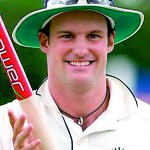 Strauss’ Final Press Conference (August)
Strauss’ Final Press Conference (August)